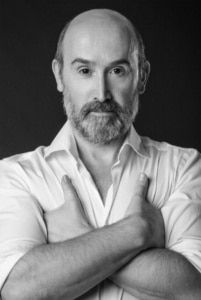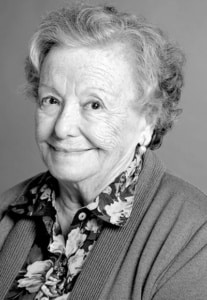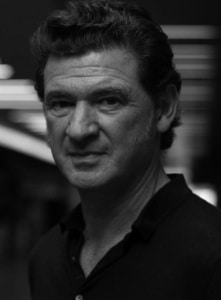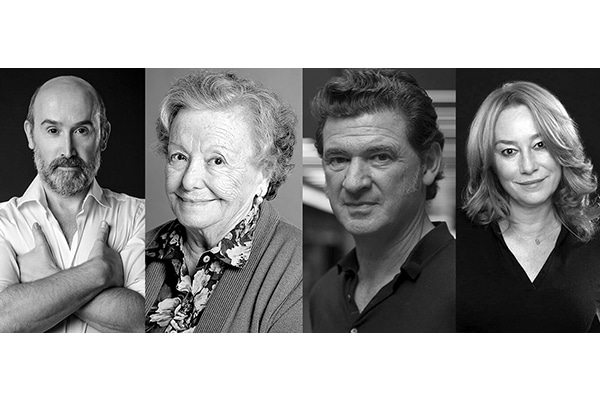14/10/2020.- Filmmakers Julio Medem and Gracia Querejeta, actor Javier Cámara and actress María Galiana will receive the Golden Honorary Spikes of the 65th Valladolid International Film Festival on 27 October in the course of the Spanish Cinema Gala Night. The distinction also awarded this year to Isabel Coixet and Charo López.
JAVIER CÁMARA

After performing in Medem’s Sex and Lucía, Almodóvar crossed paths in his career in 2002. His role as Benigno Martín in Talk to Her earned him public recognition at the European Film Awards and a Goya nomination for Best Actor, but above all it was the beginning of an intense relationship with the director from La Mancha, who later featured him in Bad Education and I’m So Excited!.
His filmography speaks volumes about him and gives proof of his skills as a versatile performer capable of embodying the Count Duke of Olivares in Alatriste or Ricardo in The Blind Sunflowers, and of his loyalty to filmmakers with whom he has repeatedly collaborated like Isabel Coixet (The Secret Life of Words, Bastille —in Paris, Je t’aime— or Yesterday Never Ends), Nacho G. Velilla (Chef’s Special, To Hell With the Ugly, Off Course) or Cesc Gay (Truman and The People Upstairs).
The winner of two Goya awards in 2014 and 2016 as best leading and supporting actor respectively for his parts in David Trueba’s Living is Easy with Eyes Closed (which also earned him nominations for the José María Forqué awards), he also bagged two Silver Biznagas for his performances in Chef’s Special and Torremolinos 73.
Cámara went international with his role as Cardinal Gutiérrez in Sorrentino’s The Young Pope, later renamed as The New Pope. The Italian director also signed him to give voice to Pope Francis in his short film Voyage au bout de la nuit, included in the series Homemade, a project devised by several filmmakers during lockdown. His latest work is Forgotten We’ll Be, a film by Fernando Trueba about the life of doctor Héctor Abad Gómez, a social activist in Medellín during the 1970s.
MARÍA GALIANA

Known to broad audiences for her role as Herminia in the TV series Cuéntame como pasó, her career encompasses other TV shows like Juncal, together with roles in classical stage plays like Lorca’s The House of Bernarda Alba or Agustín Moreto’s Handsome Don Diego. But it was the big screen that took up most of her time in those days, with acting parts in films like Pasodoble, Misadventure, Belle Époque, Banderas, the Tyrant, Turkish Passion, King of the River, Suspiros de España, Freedomfighters or Beyond the Garden.
Benito Zambrano chose her for his directorial debut, Solas, where she played Rosa, a woman who moves in with her daughter during her husband’s hospital convalescence. The film won five Goyas, including hers for Best Supporting Actress. Later she appeared in Full Moon, Fugitives, More Grief Than Glory, Roma, Tapas, Pura sangre or The Wooden Box, among others. On the stage she played in The Trojan Women, Fugadas or Conversations with Mother.
JULIO MEDEM

His first feature film, Cows (1992) earned him the Goya Award for Best New Director and became a great success in the Panorama section of the Berlin Festival. It was moreover awarded at the Tokyo, Montreal and Turin festivals and opened the gateway to one of the most personal film universes in European cinema. His second film, The Red Squirrel (1993), was awarded at Cannes, the same festival where his third film, Earth (1996), one of his most personal works, would screen in competition.
In 1997 he created Alicia Produce, his own film production company, with which he has developed part of his filmography. In 1998, with Lovers of the Arctic Circle, Medem was acclaimed by audiences and consolidated his position as one of the great values of Spanish cinema, a success that he repeated with his fifth film, Sex and Lucía (2001), a story about chance, destiny’s making and the role of love and sex in nourishing our lives.
In 2003, Medem premiered his first documentary, The Basque Ball: Skin Against Stone, which dealt with the political and social issues in the Basque Country. Chaotic Ana, released in the summer of 2007, which marked his return to fiction and, would be followed in 2009 by Room in Rome, his first story shot entirely in English, starring Elena Anaya and Natasha Yarovenko and based on the film In Bed by Chilean director Matías Bize, the winner of the Golden Spike in the 50th edition of Seminci.
In 2014 he shot Ma ma, starring Penélope Cruz, Luis Tosar and Asier Etxeandia and produced by the film’s lead actress and the director himself. The film premiered internationally at the Toronto Film Festival in September 2015. The Tree of Blood (2018) is his latest feature film to date.
GRACIA QUEREJETA

The daughter of legendary producer Elías Querejeta (Spike of Honor at the 53rd Seminci), Gracia Querejeta has built a career punctuated by distinctions. Her second feature, Robert Rylands’ Last Journey (1996), was awarded for Best Direction by Spain’s Screenwriters Association (Círculo de Escritores Cinematográficos). By My Side Again earned her eight Goya nominations; and with Héctor (2004) she won the Golden Biznaga at the Málaga Festival, where she returned to top level with 15 Years and One Day (2013).
Before that, Seven Billiard Tables (2007) had received the Best Screenplay Award in San Sebastián for a script co-authored by herself together and David Planell, as well as the Best Actress Award for Blanca Portillo. The film’s co-star, Maribel Verdú, won the Goya for Best Actress, while her fellow cast member Amparo Baró harvested the Best Supporting Actress award for her part in the film, which otherwise earned nominations in eight additional categories of Spain’s Academy Awards.
In addition to short films and collaborations in television series (Without Identity, 14 de abril. La República, or the documentary Rutas de Andalucía, she later shot the feature films Happy 140 (2015) and Wave of Crimes (2018), before she recently directed this year’s release The Invisible, which premiered just before the coronavirus pandemic resulted in the closure of movie theaters and checked the trajectory of a film that had made a powerful entry into Spain’s film scene.
